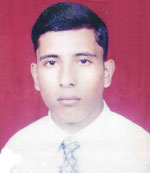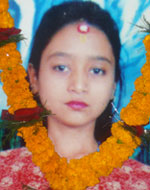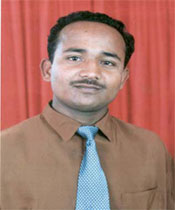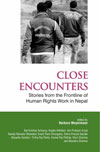Related Links
Case Updates
Krishna Adhikari
 On 6 June 2004, Krishna Prasad Adhikari, a resident of Fujel village of Gorkha District, was murdered in Chitwan District by Maoist cadres. Krishna Prasad was visiting his grandparents after having taken the SLC examinations, and he was abducted from Bakullahar Chowk by men who came on a motorcycle ...
On 6 June 2004, Krishna Prasad Adhikari, a resident of Fujel village of Gorkha District, was murdered in Chitwan District by Maoist cadres. Krishna Prasad was visiting his grandparents after having taken the SLC examinations, and he was abducted from Bakullahar Chowk by men who came on a motorcycle ... Maina Sunuwar
 Around 6 am on February 17, 2004, a group of RNA soldiers arrested Ms
Maina Sunuwar, a 15-year-old schoolgirl of Kharelthok VDC-6, Kavre
district. She disappeared since her arrest. Her family members, with
support from villagers and school where Maina was a student, visited
detention centers ...
Around 6 am on February 17, 2004, a group of RNA soldiers arrested Ms
Maina Sunuwar, a 15-year-old schoolgirl of Kharelthok VDC-6, Kavre
district. She disappeared since her arrest. Her family members, with
support from villagers and school where Maina was a student, visited
detention centers ... Sanjeev Kumar Karna
 Sanjeev Kumar Karna was one among the 11 persons arrested on October 8, 2003. On that fateful day, they had gone to attend a picnic program organized by the students at a place called Kariyachauri VDC-4, and from picnic, they went to Kataiya Chowri Area of Dhanusha district where they ate some food ...
Sanjeev Kumar Karna was one among the 11 persons arrested on October 8, 2003. On that fateful day, they had gone to attend a picnic program organized by the students at a place called Kariyachauri VDC-4, and from picnic, they went to Kataiya Chowri Area of Dhanusha district where they ate some food ... Arjun Bahadur Lama
Hari Prasad Bolakhe
Sarala Sapkota
Birendra Shah
Bishwanath Parajuli, Tom Nath Poudel and Dhan Bahadur Tamang
Chot Nath Ghimire and Shekhar Nath Ghimire
Bhauna Tharu
Conflict Victims Organise National Level Meeting to Discuss Urgent Revisions in TJ Bill
Victims from all seven provinces of the country participated in the meeting to formulate a unified stance on the provisions of the bill to amend the Disappeared Persons Enquiry, Truth and Reconciliation Commission Act (TJ bill). A total of 78 participants attended the meeting.
Victim Leader Suman Adhikari gave a PowerPoint presentation on the TJ bill and the report of the task force comprising the top three political party leaders. He said that the bill contains many problematic provisions that can provide de facto amnesty to perpetrators of human rights violations.
In one of the sessions, the International Senior Legal Advisor for the International Commission of Jurists and Advocacy Forum-Nepal's (AF) Founder Dr Mandira Sharma provided valuable insights into the TJ bill. Dr Sharma underscored the need for significant amendments to the bill to ensure it adequately addresses the needs of conflict victims. She raised concerns about the terminology used in the bill, noting that the distinction between "armed" and "unarmed" could exclude certain victims from justice.
Dr Sharma criticised the provision of claiming only 25 percent of the punishment for perpetrators, arguing that it opens the door for blanket amnesty and undermines the victims' right to full justice.
During the subsequent discussion, victims voiced their concerns about various aspects of the bill, including the guarantee of reparations, the evidentiary threshold required to prove that a deceased victim was unarmed, provisions related to enforced disappearances, reparations for victims of torture, and the sufficiency of the three-month timeframe for reporting sexual violence. Questions were also raised about the safety of victims when filing complaints against high-profile perpetrators and the course of action if the bill passes in its current form.
Following this expert session, the victims were divided into four groups to conduct rigorous discussions on the TJ bill. Each group identified distinct shortcomings in the bill and developed a set of specific demands.
Ultimately, these group discussions led to a consolidated 14-point memorandum, reflecting the collective needs and demands of the victims. This unified document will be submitted to the government to pressure for more comprehensive justice and accountability measures.
The participants said that the meeting not only provided a platform for diverse views and perspectives but also enabled the victims to develop a cohesive strategy for advocating their rights.
























Join Us